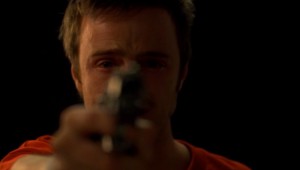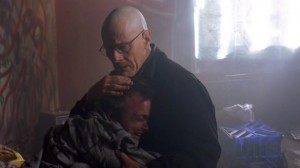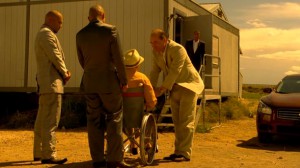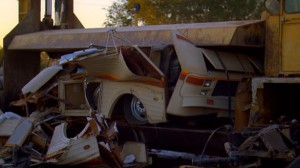Catchin’ Up with Breaking Bad: The Rest of It, Pt 1 (Episodes 2.10 – 3.06)
My original plan was to watch three episodes of the series at a time and then write about what I saw, grouping them together under clever little headings according to what I felt was the story arc for that part of the season. There were inherently two problems with that: (1) the process of watching, stopping, writing, publishing was a little slow and cumbersome and (2) once I got to late season 2, I couldn’t stop. For anything. At some point I managed to get out of the house to get supplies so I didn’t starve but, beyond the trip to Trader Joe’s, Breaking Bad and I spent a good 14 hours together this weekend.
That you people had to wait so long for tonight’s premiere is mind-boggling.
For those of you that’ve watched and are at all interested in my thoughts ongoing throughout the series rewatch, I’ve put them all here in shortened form. For those of you that haven’t watched, what exactly is it that you’re waiting for? Huh? You think someone’s gonna come to your house and put the DVD in for you? Bitch?
Sorry, got a little Jesse there for a second. You should totally watch this show though.
“Never Trust a Junkie” – Episodes 2.10-2.13
This is why I think schools should show Requiem for a Dream in schools. I know, I know. The “ass to ass” scene might be a little inappropriate but the movie has the effect of, at least temporarily making adults reconsider drug abuse. Imagine the effect on children. Imagine the effect on a young Jesse Pinkman. Maybe he focuses on his superhero that can run backwards really fast instead of contributing to the demise of Rory’s Chilton replacement friends.
These four episodes contain so many great moments, the least of which is the plane crash hinted at in cold openings all season. While I get the implications of two airliners colliding over a populated area caused by the father of the girl Jesse and Walt collaborated to accidentally kill, it didn’t have nearly as much of an effect on me as, say, Jane actually choking on her own vomit, a scene so incredibly constructed, nestled after several scenes comparing drug addicts to helpless children. Combo’s death: another big shocker, particularly since they made the kid do it. That scene has so much going for it, with its pause for effect since Combo is just as confused as we are that he was just shot, going so quickly from this position of cocky strength to hapless fool shambling away from his pint-sized assassin.
The plane crash itself, while beautifully rendered, feels like a disconnected metaphor. I understand the analogy they’re drawing on, that everything rains down on Walt from above, especially after Skyler leaves him. The crash, however, is not directly Walt’s fault. And if they really wanted the effect of everything raining down on him, they might’ve tried to show more than a stuffed animal falling into the pool. The crash isn’t Walt’s or Jesse’s fault. You can make a case for indirect cause but, at the end, it’s a distraught father still in mourning. Maybe I was just hoping that this thing that had been built up for episode upon episode would have more to do with our protagonists than just extended symbolism for Walt’s domestic life crumbling.
The important thing to draw from these episodes is the explosion and painful wreckage that is the Walt/Jesse relationship. Jane puts the hurt on the relationship by demanding his money so they can “do whatever they want” (seriously, just show Requiem to 8th graders — it’ll solve a lot of problems) and Jesse’s lack of responsible action once he and Jane slip into a destructive relationship of using and bad feedback loooping provides kindling. It’s the height of Jesse’s brash behavior, how he constantly submits to his id in a world where there isn’t room for error, particularly now that Walt is in business with a major distributor, one who is careful, precise, and quietly impressive. Everything Walt should want to be.
While the end of season 2 didn’t impress me, the set up for season 3 totally did. Which is why I threw caution to the wind and pounded the rest of the series.
Getting Back on the Horse (Episodes 3.01-3.03)
In which we are introduced to the Elf-Boot Brothers, the Latino version of Michael Myers except in double-vision and privileged with better weaponry but cursed with terrible footwear.
After the events of season 2, Walt and Jesse are in no mood to really go back to the work that destroyed their lives. Gus can’t seem to make a pay-out attractive enough to Walt; Jesse is preoccupied with rebuilding after rehab. Both are unraveling slowly but they both make concerted efforts to their conventional lives to the abandonment of their clandestine ones.
This is as good a time as any to mention Aaron Paul knocking the Jesse character out of the park. I’ve mentioned before that this could’ve been a deeply annoying character with his “from the streets” persona and bungled efforts in everything he does but, over the course of 20+ episodes, the writers and the actor have given Jesse a heart that is not only endearing but equally heartbreaking. The difference in persona be has when talking to his father here, the confidence mostly, as opposed to his trembling, weakened-man-child performance for his parents the last time he came to visit, shows an impressive range. And tell me you didn’t feel a tug in your chest when Jesse calls Jane’s voicemail over and over again just to hear her voice only to finally hear that disconnected message, concretizing that she really is gone. If you didn’t, you’re either lying or a robot.
The hangover of Jane’s absence sends Jesse back to cooking but Walt still holds out since he has far more to lose by going back. That is until Skyler uses her gambit of adultery to shiv him in the stomach. You can see Walt’s collected nature, the one that got him back in the house, the one that has won everyone over except for the wife that knows his secret, drain out of his face and replaced by the faint snarl of Heisenberg as his alter ego starts to unravel the “normal” life. That last look from him at the end of “I.F.T.” shows us that it’s only a matter of time. Heisenberg will ride again.
Tu Sabes (Episodes 3.04-3.06)
Hank is another one of those characters that could have been a disaster. His brusque attitude and penchant for the low-brow one-liner could easily suffered a one-dimensional fate among his more nuanced fellow male characters (you know, like the female characters on this show). The show was willing to show his vulnerability and, unlike other programs that gloss over the effects of facing death, either one’s own or the sympathetic other, Hank’s PTSD from the Tortuga bomb (and I don’t mean the jester of Tortuga) and his fear of success, not to mention his weakness when it comes to dealing with his wife, gives the archetype of a no-nonsense cop an added dimension necessary for the premise of the show. Hank is also a very good agent, has a gut-o-meter like you wouldn’t believe, and proves his worth time and again. If there wasn’t that soft spot in his character, it would be hard to believe that Hank wouldn’t put two and two together to implicate Walt in these crimes. Hank’s blind spot for family keeps this thing going while also providing ample room for scenes between two people that are clearly bitter rivals even if the cop isn’t privy to that.
That being said, it’s about time for Hank to catch on a little better. Walt and Jesse are at their most divided as one is goes through a meltdown and the other strikes out on his own. Combine that with Gus’s gambit to get Walt cooking again and their split solidifies. Without them working together, the story opens up for Hank to get a starring role again as he hunts down Pinkman. It brings our two protagonists together (which made me feel good since I hate to see them fighting) to a common enemy, of whom that Walt knows the vulnerabilities. It’s about more than our leads outwitting The Man. This isn’t Dukes of Hazzard and Hank isn’t Boss Hogg. This is Walt abusing his brother-in-law status to reduce a man to an anxious mess in order to maintain his illegal practice. A more nuanced approach with a similar conclusion: Walt and Jesse live to ride again.
The destruction of the RV is sad and given a fitting end: being smashed to pieces while Walt and Jesse look on, a rare soundtrack underneath. Meanwhile, though we learned it closer to the beginning of the season when the Brothers Elf-Boot were called off the Walt hit, the assassins are established as foot soliders for Gus and redirected to Hank. Gus plays a deadly game, one of deep manipulation and calculated consequences. As much as they believed Tuco to be a psychopath, Gus is certainly a sociopath, seemingly without conscience in his business handlings. Breaking Bad as a series loves the Greek chorus approach to storytelling: giving away pieces of the tale before telling it. It’s not quite in media res as we don’t exist in the middle of the story for very long but long enough to get some details we can pick up on later to improve our understanding of what’s going on. It’s almost as if these sequences in Spanish (which, I’m not sure as it aired if they were subtitled — maybe I should’ve seen if I had that option turned on) are the in-episode versions of the cold openings. You don’t know exactly what’s supposed to happen since you don’t know what exactly they’re saying (unless you know Spanish — then stuff isn’t really all that surprising) but you can pick up on certain words and reactions: Heisenberg, Walter White, Hank, DEA, etc. You know something is happening but can’t know for sure what it is or where everyone’s head is. Again, I might be making all that up because I’m too lazy to look for the Subtitle button.
- July 17, 2011
- Nick
- DVD Rewatch
- Breaking Bad





